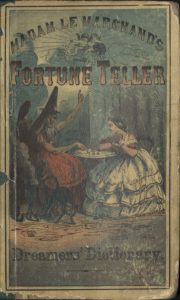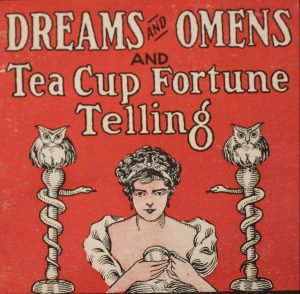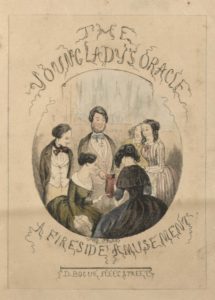 My name is Chloe Otterson and I have had the amazing opportunity to work with Special Collections to research nineteenth century supernatural phenomena. Before I continue, allow me to introduce myself. I’m a freshman originally from rural New England, but I am steadily growing accustomed to living in a city. I plan to pursue a double major in the Writing Seminars and Psychology. I have two dogs and three siblings and my favorite ice cream flavor is salted caramel. I hope you know a little bit more about me now. How did I get here, and more specifically how did I find myself in the Special Collections Reading Room learning that dreaming of pineapples foretells crosses and troubles?
My name is Chloe Otterson and I have had the amazing opportunity to work with Special Collections to research nineteenth century supernatural phenomena. Before I continue, allow me to introduce myself. I’m a freshman originally from rural New England, but I am steadily growing accustomed to living in a city. I plan to pursue a double major in the Writing Seminars and Psychology. I have two dogs and three siblings and my favorite ice cream flavor is salted caramel. I hope you know a little bit more about me now. How did I get here, and more specifically how did I find myself in the Special Collections Reading Room learning that dreaming of pineapples foretells crosses and troubles?
My sister, a current sophomore at Johns Hopkins (all three of my siblings are current JHU undergrads!), sent me a link over the summer for the Freshman Fellows program with the brief message: “Do this.” She has yet to truly steer me down the wrong path, so I looked into the program and I am so glad I did. I’ve had an interest in all things supernatural and otherworldly since I was little, so when I saw the collection “Conversations with the Supernatural”, I knew I had to apply.

I have absolutely loved exploring the material. Palmistry guides, horoscopes, dream omens, phrenology…what more could you ask for? One book was even owned and signed by Sir Arthur Conan Doyle! For the past couple of months, all of my anecdotes have been vaguely disturbing facts about what people believed in the nineteenth century. Did you know that people believed having a pineapple-shaped head (There are a lot more references to pineapples than you would think.) indicated that you were a boaster? Some of my favorite parts have been the introductions of the books. Often, they serve to justify or legitimize their topics or simply to explain their positions. One claims it is a translation of a book by Napoleon Bonaparte. They zoom in on aspects of life we barely blink at today, such as the phenomena of how we often dream of actual people and situations. While today I might simply chalk it up to stress over an upcoming exam or a weird sandwich I ate the day before, nothing is a coincidence for nineteenth century believers.
The author of The Spirit World Unmasked, Henry Ridgely Evans uses the theory of evolution to support his argument for the spiritualistic school of thought while also having a moment existential dread:
“Evolution points to eternal life as the final goal of the self-conscious spirit, else this mighty earth-travail, the long struggle to produce man are utterly without meaning” (Evans 14).
What really resonates with me is how people in the nineteenth century attempt to grapple with life around them from new scientific discoveries to the changing roles of women. For my research, I want to study the supernatural through the lens of humanity. Nobody just decides that the size and shape of a person’s head says everything about their character for no reason. As a hopeful writer, my interest is in exploring the human condition. Participating in the supernatural and conducting yourself as an expert in the supernatural held a lot of power especially for women and minorities and I look forward to learning more about the practices and how they affected social issues of the time.

